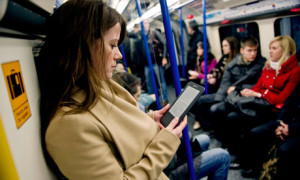One of the things I remember from my time in school learning to be a librarian was something the professor in the Reference Services class I took during my first semester said: never apologize for what you read.
This is just one of those quotes that is so simple and yet so true. Why should you apologize for what you read? Reading is done for you and no one else. Reading a book lets you learn something you didn’t know, it entertains you, and it provides an escape valve.
It is also very hard to put into practice. Or it was, at least. People judge people. They judge them based on what they wear, how they talk, what they say, what they do, and what they read. I  commute to work every day on public transit. Lots of people around me on the bus are reading something during this time. Some read novels, some read newspapers, some read emails (which really, is just poor security practice, but that’s neither here nor there), and an ever increasing number are reading on eBook readers. Prior to eBook readers you could tell at a glance what someone was reading: a comic book, science fiction, a romance novel, a spy thriller, classical literature, a textbook, and in seeing what they were reading you would learn something about them. Not with eBook readers, though. From the front they all look the same. You might be able to tell something based on what brand they have: is it a kindle, is it a kobo, is it a Sony ereader? I know that their decision says something about them to someone, but not nearly as much as what book they are reading.
commute to work every day on public transit. Lots of people around me on the bus are reading something during this time. Some read novels, some read newspapers, some read emails (which really, is just poor security practice, but that’s neither here nor there), and an ever increasing number are reading on eBook readers. Prior to eBook readers you could tell at a glance what someone was reading: a comic book, science fiction, a romance novel, a spy thriller, classical literature, a textbook, and in seeing what they were reading you would learn something about them. Not with eBook readers, though. From the front they all look the same. You might be able to tell something based on what brand they have: is it a kindle, is it a kobo, is it a Sony ereader? I know that their decision says something about them to someone, but not nearly as much as what book they are reading.
I’ve had people stop and talk to me when I’m reading in a coffee shop or on the subway because they recognize what I’m reading (most often when it is either one of Spider Robinson’s Callahan books or one of Terry Pratchett’s Discworld books, for those who are curious) and are happy to meet someone else who shares an interest of theirs. A major plot device in a recent episode of How I Met Your Mother involves the main character meeting a woman because he notices on the subway that they are reading the same book. That won’t happen with an eBook reader unless they have been reading over my shoulder and recognize a passage, and that just seems a bit creepier than seeing the cover of the book.

With eBook readers people can read whatever they want without fear of being judged for it by others. I have often wondered if this sudden freedom and anonymity of reading material is in any way related to the popularity of the 50 Shade of Grey series. Did they become popular in the mass market because people could read them without fear of being judged by others? Did eBook reader sales take off suddenly so that people who are starved for time could read them while commuting to and from work? Is there correlation AND causation? I will look into this and report back.
One of the selling features of eBook readers is that you can carry an entire library with you. What they don’t mention is that now no one needs to know what is in that library unless you want them to know.
